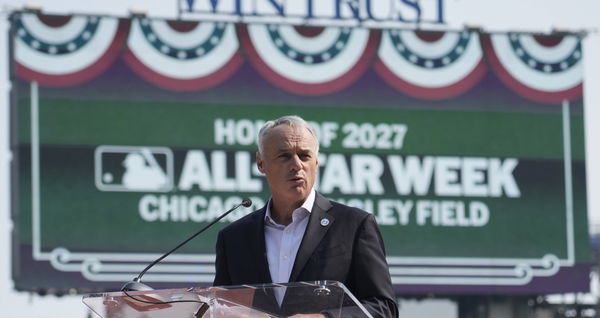
Imago
MLB, Baseball Herren, USA Chicago Cubs press conference, PK, Pressekonferenz Aug 1, 2025 Chicago, IL, USA Baseball commissioner Rob Manfred announces Major League Baseball and the Chicago Cubs will host the 2027 All Star game at Wrigley Field. Chicago Wrigley Field IL USA, EDITORIAL USE ONLY PUBLICATIONxINxGERxSUIxAUTxONLY Copyright: xDavidxBanksx 20250801_jla_bb6_168

Imago
MLB, Baseball Herren, USA Chicago Cubs press conference, PK, Pressekonferenz Aug 1, 2025 Chicago, IL, USA Baseball commissioner Rob Manfred announces Major League Baseball and the Chicago Cubs will host the 2027 All Star game at Wrigley Field. Chicago Wrigley Field IL USA, EDITORIAL USE ONLY PUBLICATIONxINxGERxSUIxAUTxONLY Copyright: xDavidxBanksx 20250801_jla_bb6_168
Remember a few months back when MLB commissioner Rob Manfred floated the idea of moving toward a national-style broadcasting model like the NBA? It’s still way too early to say we’re actually headed there, but some signs are pointing in that direction.
Watch What’s Trending Now!
Well, the way fans watch baseball is on the verge of a significant shake-up!!!
MLB is set to overhaul its distribution setup, aiming for a future where traditional TV and streaming live events coexist. And whether that blend turns out to be the right move, only time will tell. But for now, we’re already seeing some familiar faces return to the broadcast scene, and a few new ones debut, as the league experiments with what comes next.
“MLB has formed new three-year media rights agreements with Netflix, NBCUniversal, and ESPN….” MLB shared via Instagram.
So yes, it would be a multi-modal broadcasting involving several entities.
View this post on Instagram
The brightest spot is ESPN returning to the mix after walking away from “Sunday Night Baseball” earlier this year. Even so, their return came at a noticeable discount for MLB.
Previously, they were paying around $550 million for Sunday Night Baseball. Now, MLB is getting roughly $250 million for what’s essentially the same set of games—a drop of about $300 million! And in total, ESPN is paying $550 million total for its full bundle of rights and midweek games.
Meanwhile, NBC is stacking its sports lineup… It now has MLB, the NBA, and the NFL across its broadcast network, its new cable sports channel, and Peacock. NBC will also air the entire Wild Card round every season—anywhere from eight to 12 games. They reportedly spend about $200 million a year on that package.
Then there’s Netflix, which continues dipping further into live sports. Along with a three-year deal to carry the Home Run Derby, they’re getting exclusive rights to Opening Night for the next three seasons. They’ll also serve up all 47 games of the 2026 World Baseball Classic to viewers in Japan. That deal runs around $50 million a year.
Now, money aside, gains, losses, and everything in between, MLB is clearly stepping into a whole new era of broadcasting. But at what cost?
MLB’s new broadcasting rights might not be as bright as they seem
Well, MLB is technically bringing in more total media money now, but only after involving multiple broadcasters. Compared to the NBA, which nearly tripled its national media haul in its latest deal, MLB has more work to do.
So what does all this mean for fans?
For starters, Netflix will handle July’s Home Run Derby and will air the standalone Opening Night matchup between the Yankees and Giants. But with over 300 million subscribers, could it cover the entire fan base? So, a few more incoming new subscriptions are expected.
But the big question is: what’s the actual cost for fans who want to follow their team and catch all the big tentpole events without hassle?
Here’s the reality check…
In-market streaming for your local team costs around $30 a month. Add Peacock at roughly $15. Netflix is another $20-ish. That’s already around $65. So, if you’re a diehard MLB fan who wants everything, you now know how much to shell out!
So yes, it’s steep, but all part of MLB’s return to NBC for the first time since 1999—a tough setup for fans to navigate, but one that signals even more changes on the horizon.

